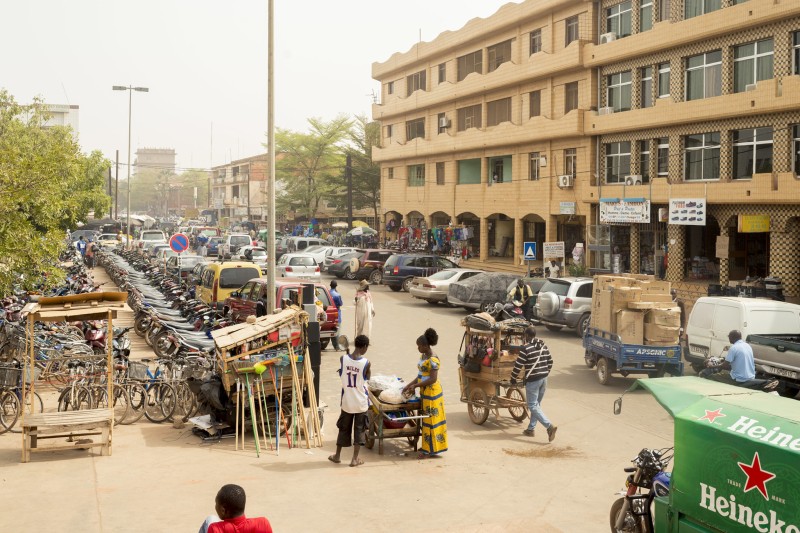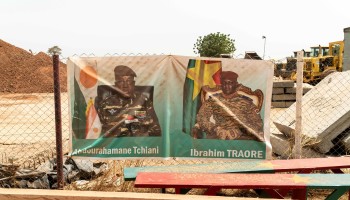A parliamentary report on links between a housing crisis and property development practices in Burkina Faso was “deliberately withheld” to protect members of the former ruling party, according to a leading anti-corruption group in the West African country.
Municipal councils doled out far more land to real estate companies than they were legally permitted to, according to the unpublished report obtained by OCCRP.
The report was produced by a parliamentary commission of inquiry established in 2020 under the People's Movement for Progress (MPP), the ruling party at the time. It was meant to be made public before national elections at the end of that year, but was never released.
The government “deliberately withheld” the report in order to avoid criticism of “certain regime leaders or their economic allies,” said Sagado Nacanabo of Réseau National de Lutte Anti-Corruption, a civil society organization in Burkina Faso.
The report named real estate companies that had benefitted from land grants distributed by municipal councils. At least one of the companies was connected to MPP politicians, reporters found.
“Land has always been one of the main sources of illicit enrichment for [political] leaders and their economic allies,” Nacanabo told OCCRP.
OCCRP did not receive responses to messages and calls to a phone number for Alassane Bala Sakandé, the MPP’s current president who was parliamentary president at the time of the inquiry.
According to the unpublished report, the biggest beneficiary of lands granted by municipal councils in the area around the capital, known as Greater Ouagadougou, was a company called Assistance Technique et Travaux Publics (ATTP).
Corporate records show that Pegdwende Roger Nikiema, an MPP municipal councillor at the time of the parliamentary inquiry, was a co-owner of ATTP when it was set up in 2017. Corporate records for the years that followed were unavailable, but media reports have referred to his involvement in the company until at least 2024.
Another MPP politician, Abdoulaye Sourgou, was also an ATTP executive according to his social media posts in 2019, as well as posts on the company’s page. Local media also reported his involvement in the company the following year. Aside from a failed bid for office himself under the MPP banner, Sourgou helped run the successful presidential re-election campaign for Roch Marc Christian Kaboré in the November 2020 elections.
A spokesperson for Kaboré — who was overthrown in a coup in 2022 — did not respond to a request for comment. Neither Nikiema nor Sourgou responded to questions.
The unpublished report names other real estate firms aside from ATTP, but journalists were unable to identify the owners in Burkina Faso. Access to corporate information is extremely limited in the country.
Land rights and housing are controversial topics in Burkina Faso, where a growing population suffers from a lack of affordable homes. A 2008 real estate development law aimed to liberalize the sector and encourage private developers to build more housing. But weaknesses in the legislation have allowed companies to acquire land plots, which they flip for a profit without undertaking any construction.
Kaboré promised to solve the crisis when he first led the MPP to power in elections in 2015. Instead, the problem worsened and the number of licensed real estate companies jumped from 57 to 275 by 2019.
The unpublished 2020 parliamentary report said private real estate developers often obtained rights to land in rural areas in exchange for promises to build housing or infrastructure such as buildings for education, health, or cultural activities.
However the promised buildings often did not appear, and instead, “almost all real estate developers are engaged in the sale of undeveloped plots.”
The report said some companies had obtained more land than they could possibly afford to develop, which indicated there had been “land grabbing and land speculation on the part of private real estate developers.”
At the time of the inquiry, ATTP had gained rights to over 3,200 hectares. The company that received the second largest amount had just under 2,500 hectares.
Municipalities are legally permitted to transfer land up to 50 hectares. But the inquiry found that seven municipalities in the Greater Ouagadougou area had given out parcels of land larger than that. Some were more than double the legal limit, even reaching hundreds of hectares.






